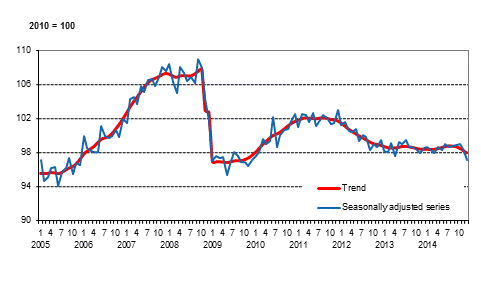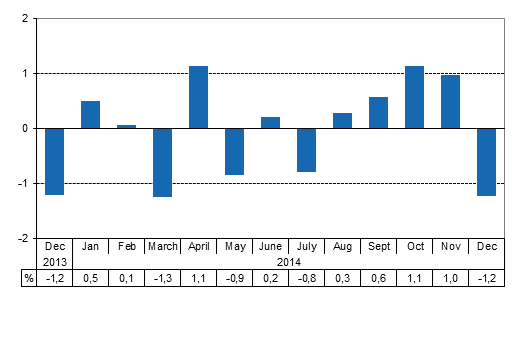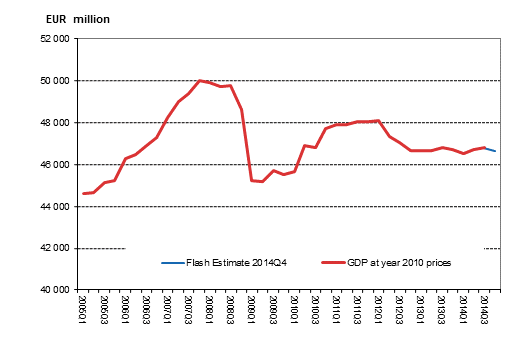Published: 13 February 2015
Output of the national economy decreased in December 2014
Seasonally adjusted output decreased by 1.4 per cent in December from the month before. Adjusted for working days, output went down by 1.2 per cent from the level of December 2013. The working day correction affected the growth figures of December considerably as, according to the original series, output of the national economy increased by 0.6 per cent from one year ago in December. This was largely because December 2014 had two working days more than December 2013. According to revised data, working day adjusted output increased in November by 1.0 per cent from November 2013 (previously 0.9%).
Volume of total output 2005 to 2014, trend and seasonally adjusted series

The series of the Trend Indicator of Output are seasonally adjusted with the Tramo/Seats method. The latest observations of the series adjusted for seasonal and random variation (seasonally adjusted and trend series) become revised with new observations in seasonal adjustment methods. Revisions especially at turning points of economic trends may be significant, which should be taken into consideration when using seasonally adjusted and trend data.
Working day adjusted change of total output from previous year’s corresponding month, %

Primary production went down by one per cent, secondary production by three per cent and services by close on one per cent from December 2013.
Secondary production includes manufacturing and construction. Services comprise trade, hotel and restaurant activities, transport and business activities, as well as real estate, renting and research services, financial intermediation and insurance, and public services. Primary production refers to agriculture, hunting, forestry and fishing.
Estimated development of GDP and employment in the fourth quarter of 2014
Seasonally adjusted GDP is estimated to have fallen by 0.3 per cent from the previous quarter. According to the series adjusted for working days, GDP went down by 0.3 per cent from the corresponding quarter of the year before. In the monthly time series, the effect of the working day adjustment is larger than in the quarterly time series of GDP. It is estimated that the number of the employed has contracted by 0.3 per cent from the last quarter of 2013. In contrast, hours worked increased by 1.4 per cent from the fourth quarter of 2013.
The data are based on preliminary data of the Trend Indicator of Output. The next quarterly national accounts with more detailed data will be published on 2 March 2015.
Flash estimate, seasonally adjusted, at reference year 2010 prices

Intermediate consumption as well as taxes and subsidies on products are not estimated in the compilation of the quarterly flash estimate, but quarterly GDP is carried forward with a change based on the data of the Trend Indicator of Output.
Source: Trend Indicator of Output 2014 December, Statistics Finland
Inquiries: Veli-Pekka Karvinen 029 551 2667, Samu Hakala 029 551 3756, kansantalous.suhdanteet@stat.fi
Director in charge: Leena Storgårds
Publication in pdf-format (189.8 kB)
- Tables
-
Tables in databases
Pick the data you need into tables, view the data as graphs, or download the data for your use.
- Revisions in these statistics
-
- Revisions in these statistics (13.2.2015)
Updated 13.2.2015
Official Statistics of Finland (OSF):
Trend Indicator of Output [e-publication].
ISSN=1798-5439. December 2014. Helsinki: Statistics Finland [referred: 19.4.2025].
Access method: http://stat.fi/til/ktkk/2014/12/ktkk_2014_12_2015-02-13_tie_001_en.html

